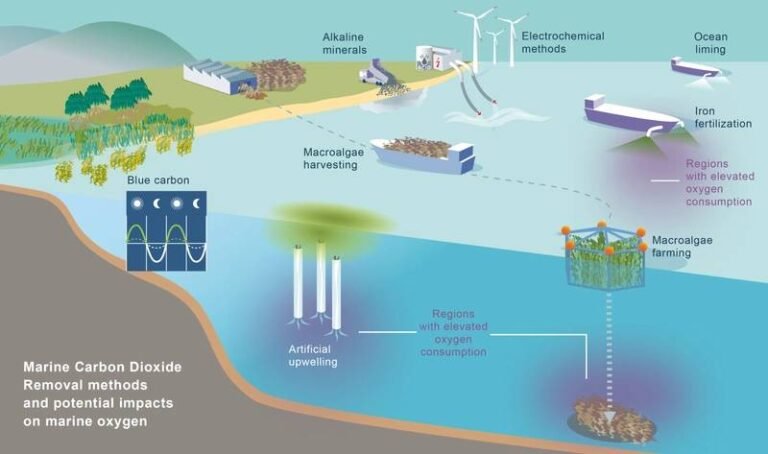The Impact of Ocean Carbon Dioxide Removal Methods on Marine Oxygen Levels
As the world grapples with the effects of global warming and the urgent need to reduce carbon dioxide (CO₂) emissions, innovative methods to enhance the ocean’s uptake of CO₂ are being explored. However, a new study led by Prof. Dr Andreas Oschlies from the GEOMAR Helmholtz Centre for Ocean Research Kiel highlights the potential impact of these methods on marine oxygen levels.
The Link Between CO₂ Removal and Ocean Deoxygenation
Global warming is a major contributor to the loss of oxygen in the ocean, with approximately two percent of the ocean’s oxygen inventory being lost in recent decades. Additional warming is expected to further exacerbate this oxygen loss. The study reveals that certain proposed marine carbon dioxide removal (mCDR) methods, particularly those based on biological processes, could worsen ocean deoxygenation.
According to Oschlies, “What helps the climate is not automatically good for the ocean.” The study, conducted by an international team part of the UNESCO Global Ocean Oxygen Network (GO2NE), used global model simulations to assess the direct and indirect impacts of various mCDR approaches on ocean oxygen levels.
The Role of Biotic and Geochemical mCDR Methods
The study identifies biotic mCDR methods such as ocean fertilization, large-scale macroalgae farming, and artificial upwelling of nutrient-rich deep water as critical, as they involve processes that consume oxygen through biomass decomposition. In contrast, geochemical mCDR approaches like ocean alkalinity enhancement have minimal effects on ocean oxygen levels.
Among the methods examined, only large-scale macroalgae farming with biomass harvesting showed potential for increasing oceanic oxygen levels by removing nutrients that limit oxygen consumption. This approach could even reverse past oxygen losses caused by climate change within a century.
Implications for Future Research and Deployment
The authors emphasize the importance of including oxygen measurements in all future mCDR research and deployment efforts. Oschlies highlights the need to carefully consider the impact of large-scale intervention on the already fragile marine environment, ensuring that efforts to combat climate change do not inadvertently harm marine life.
As we navigate the complex challenges of climate change and ocean health, it is crucial to prioritize solutions that not only address CO₂ emissions but also safeguard the delicate balance of marine ecosystems. By understanding the implications of different mCDR methods on ocean oxygen levels, we can make informed decisions to protect our oceans for future generations.

